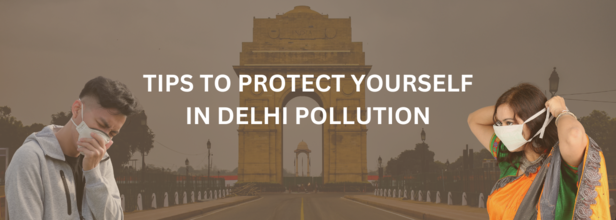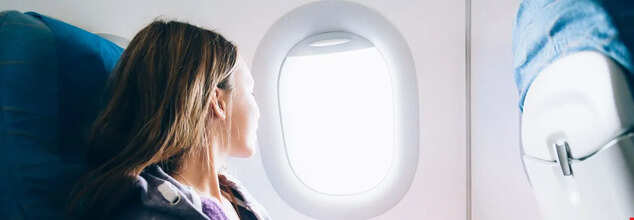- Health Conditions A-Z
- Health & Wellness
- Nutrition
- Fitness
- Health News
- Ayurveda
- Videos
- Medicine A-Z
- Parenting
- Web Stories
Delhi Air Pollution: Tips To Protect You And Your Family

Credits: Canva
Delhi air pollution continues to worsen, as of November 19, AQI at most places in Delhi recorded at AQI. As a measure, the government has implemented GRAP-IV, which has banned specific vehicles, and shifted classes online. The University of Delhi also goes into online mode.
The AQI level remained in the "severe" category with Mundka at 919, ITI Jahangirpuri at 762, and Anand Vihar at 624.
Delhi Smog And Health Risks
- AIIMS Delhi has also noted a sudden hike in OPD patients with respiratory health issues like asthma, and Chronic Obstructive Pulmonary Disease (COPD). With the ever-increasing levels of air pollution across the globe, especially in urban areas, protecting your respiratory health has become more crucial than ever.
- A person suffering from COPD experiences frequent coughing, wheezing, shortness of breath, fatigue, and frequent respiratory infections.
- Environmental pollution, including air and water pollution, has a direct impact on generating stress responses in the digestive tract, resulting in a variety of digestive illnesses.
- High AQI and air pollution can significantly affect eye health. Exposure to pollutants like particulate matter (PM), ozone, and nitrogen dioxide irritates the eyes, leading to discomfort, dryness, redness, and even more serious conditions over time
- With increasing levels of particulate matter, UV rays, and toxins in the air, pollution is compromising the skin's natural barrier, leading to dryness, dullness, and heightened sensitivity.
- Air pollution has a massive impact on your cardiovascular health. Particulate matter, particularly PM2.5, is a key factor in air pollution-related mortality, contributing to over 57% of global deaths from cardiovascular issues.
- Heavy metals like lead and mercury, along with volatile organic compounds, have detrimental effects on brain function. Neurotoxins from pollution can bypass the blood-brain barrier, triggering inflammation, oxidative stress, and neuronal damage.
- Doctors and experts have also taken note of the rise in pollution, and have observed diseases they have not seen before.
- Dr Sanjay Jain, a Delhi-based ENT and a member of DocTube also noted an increase in the number of patients with respiratory issues. "I have seen a notable increase in patients with upper respiratory tract infections, chronic sinusitis, and allergic rhinitis, which are directly linked to rising pollution levels," he says. From his experience, he has noticed a rough increase of 30 to 40% of patients with pollution-related ENT issues.
What Can Be Done?
- You can naturally cleanse your nasal passage and lungs by taking a steam, practicing control coughing, drinking green tea, consuming anti-inflammatory food items, and by consuming honey. You can also try Yoga to improve your breathing and cleanse your lungs.
- Continue to check AQI forecasts near your area and keep a note of it to know when to avoid going out. Unless it is absolutely necessary, only then step out.
- For your skin, cleansing, moisturising, and protecting it with sunscreen. You must include antioxidants in your diet and may consider detoxifying treatments.
- To protect your eyes, wear sunglasses, use lubricating eye drops, stay indoors and keep the windows closed, practice eye hygiene and invest in an air purifier.
- If you must step out, choose the afternoon time, as it is when the pollution is at its lowest. Dr Vivek Nangia, a Gurugram-based pulmonologist and a member of DocTube says that pollution levels tend to be slightly lower in the afternoon, however, it is vital to wear well-fitted masks.
- Choose the correct mask, experts suggest that we go with N99 and N100 masks, which provide higher filtration. They are more efficient than N95 masks. Dr Sandeep Nayar, Principal Director and HOD, Chest & Respiratory Diseases at BLK-Max Super Speciality Hospital explains that preferably N95 should be considered as normal surgical masks do not prevent you from getting exposed to smaller pollutants including PM2.5 particles which may directly enter your airways and may diffuse into the blood and affect all organs of body.
Staying Socially Active May Be Key To Longer Living

(Credit-Canva)
Friends play an important role in our lives. They bring joy, comfort and a sense of comradery to our lives. While not everyone is an extrovert, who enjoys making friends everywhere and finds joy in interacting with new people, one must have a few friends they can rely on, not just to enjoy each other’s company, but also to lean on when you need help. If you are a person who enjoys keeping to themselves and does not think you need to socialize, then you are wrong! A new study found that the key to a long and healthy life could, in fact, lie within social interactions.
The study shows that older people who stay involved with others are much more likely to live longer lives. Published in the Journal of the American Geriatrics Society, the study proved that seniors who are social have a lower chance of dying early compared to those who spend a lot of time alone. Being social means doing things like talking to friends, joining groups for hobbies or sports, or helping out with charity work. It really highlights how connecting with others can boost how long you live.
Why Social Activity Matters for Health
The researchers explained that while people may think staying social is a personal choice, if you wish to live a longer and healthier life, it may be necessary. This study suggests that being social might actually slow down the natural aging process of a person's body. Also, it often makes older adults more active physically, which is great for their health. So, being social doesn't just feel good; it helps your body stay stronger for longer.
How the Study Was Conducted
Researchers kept track of almost 2,300 Americans who were 60 years old or older. These people were already part of a bigger health study. Everyone filled out surveys about their daily lives, including how much they socialized. The researchers then put these seniors into three different groups: those who were very social, moderately social, or not very social. After that, they looked at whether being social had any impact on their health or how long they lived.
Specific Social Activities That Help
The study clearly showed that being social, whether a lot or a moderate amount, greatly lowered the chance of dying. Compared to older adults who weren't very social, those who were highly engaged had a 42% lower risk of dying, and those moderately engaged had a 47% lower risk. The study also pointed out specific activities that made a difference: volunteering or doing charity work lowered the risk by 51%, joining social or sports clubs by 28%, and even playing with grandkids by 18%. These findings really show how being part of your community helps older adults stay healthier.
These 3 Habits Could Be A Game Changer For Your Weight Goals

(Credit-Canva)
Our lifestyle habits have a bigger impact on our weight journey than we may realize. Things like what kind of food we eat, how much we work out and how healthy our habits is does make a difference. A new study has found habits that are a game changer for those who want to lose weight. These habits may seem inconsequential or unimportant, but the study shows how much it impacts our health
Published in the journal Nutrients, the study provides concrete evidence that how you eat can be just as crucial as what you eat when it comes to managing weight and preventing overeating. Researchers found that taking smaller bites, chewing more, and listening to slow music can significantly lengthen meal duration, which in turn can lead to reduced food and calorie intake.
Why Should You Eat Slower?
In the study, each participant ate four small pizza slices under varying conditions, including listening to different metronome rhythms (40, 80, or 160 beats per minute) or no music. Researchers meticulously measured meal duration, number of bites, number of chews, and chewing speed. Researchers found three things:
On average, female participants took about 4.5 bites to finish a pizza slice, compared to 2.1 bites for men. Women also chewed an average of 107 times during their meal, while men chewed 80 times. Consequently, women's meals averaged 87 seconds, versus 63 seconds for men.
The study found a direct correlation between meal duration and the number of bites and chews, with the sex of the person. Smaller bites and more chewing led to longer meals, while larger bites and fewer chews resulted in shorter ones.
Participants who listened to slow metronome rhythms at 40 bpm consistently took more time to finish their meals.
What Are Some Important Tips To Follow?
Smaller Bites Help You Feel Full
When you take smaller bites, you eat slower. This gives your body more time (about 20 minutes) to realize it's full. By slowing down, you're less likely to overeat because your body gets the signal it's had enough food.
Chewing More Slows You Down
Chewing your food more also makes your meal last longer. If you chew more for each bite, you'll naturally eat less food over time. This extra chewing also helps your body release hormones that tell you you're full, preventing you from feeling hungry too soon.
Music Can Calm Your Eating
Calming, slow music during meals helps you take smaller bites and chew more. It creates a relaxed setting where you can focus on your food. This helps you notice when you're full and truly enjoy the taste, leading to slower and more mindful eating.
How To Avoid Overeating?
For people aiming to manage their weight or curb overeating, the core takeaway is clear: reduce the amount of food in each mouthful. Chew thoroughly, and avoid taking your next bite until you've completely finished the first. Aim for a meal duration of around 15 minutes. Beyond music, chewing, and smaller bites, simply being "in the moment" during meals can make a big difference. Pay attention to the sensory experience of your food – its taste, texture, and aroma. Remember, eating is not a race. The faster you eat, the more you tend to consume.
Why Should You Must Apply Sunscreen Inside A Plane?

Credit: Canva
I love everything about travelling—the journey, the suitcase, and the sense of thrill. But one thing that really leaves me struggling is the condition of my skin after a long flight. The low air pressure and dehydrating air in the plane suck out every ounce of moisture from my skin. However, I recently discovered that what is even more dangerous is its exposure to harmful ultraviolet (UV) rays from the sun. What a lot of people don't know is that these harmful UV rays affect your skin even more when you are up there, at a higher altitude.
Therefore, health experts have warned that you should always wear sunscreen while onboard a plane. Moreover, wearing a relevant Sun Protection Factor (SPF) is especially important if you get a window seat rather than an aisle seat. Elizabeth Japal, from The Derma Lab, emphasises that many people do not realise that UV exposure actually increases as we move up in altitude, and aeroplane windows do not block all the UVA rays, which are the primary cause of premature skin ageing. "You’re essentially sitting next to a magnified sun bed, especially in the window seat," she told a leading media house.
This, combined with the low humidity of the cabin, makes your skin vulnerable to dehydration, dullness, and damage. "It's not just about how you look stepping off the plane—regular exposure to this kind of environment can really take a toll on skin health over time." The experts have encouraged people to prep their skin before travelling, whether you are flying short or long-haul. And yes, you still need to wear SPF even if it's cloudy and grey.
Urging people to prep before they step foot in the airport, Elizabeth says that this applies to everyone, whether you are flying short or long-haul. And yes, you still need to wear SPF even if it's cloudy and grey.
So, What Should We Do?
Dr Japal and other dermatologists suggest that you must clean, hyderate and apply a proper sunscreen before catching that flight. Here are 4 steps that you must follow:
1. Cleanse Properly Before Flying
In her number one rule, Dr Japal urges people to cleanse before flying. “Starting with clean skin is essential. Your face will already be exposed to the drying effects of cabin air—leftover makeup, SPF, or pollution will only clog pores and contribute to inflammation,' she told a leading media website.
2. Hydrate Your Skin
Both before and during the flight, you should spritz some mist on your face for hydration. The recycled air on planes can sap your skin of moisture within minutes. Doing this throughout the flight helps prevent dehydration and delivers an instant glow.
3. Hydrating Serum
Serums are your skin's drink of water. Layering a serum underneath your moisturiser maximises hydration while boosting antioxidant protection.
© 2024 Bennett, Coleman & Company Limited

